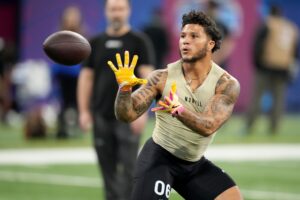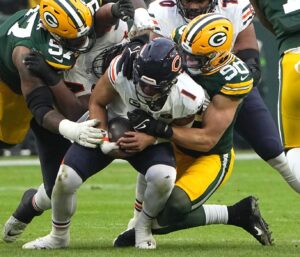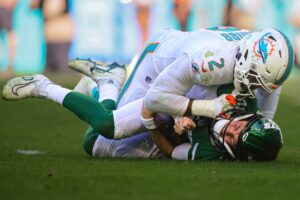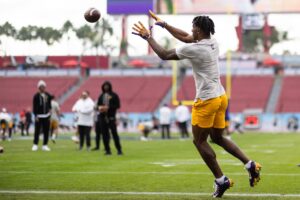With the regular season in the books, the NFL is entering its illustrious postseason stage.
In a year marked by the 100th NFL season, it is only fitting that a new century of pro football history will produce some thrilling playoff games. What makes this postseason special is it will take place at the dawn of a new decade.
Like decades of the past, the NFL Playoffs in the 2010s saw dynasties form, come from behind victories and controversial calls. History will look fondly on the 2010s as a whole, producing some unforgettable postseason moments.
The 10 Best NFL Playoff Games of the 2010s
10. 2011 AFC Wild Card, Denver Broncos 29, Pittsburgh Steelers 23 (OT)
This playoff game exemplified “Tebow Time.” The 2011 NFL season saw former Florida Gators quarterback Tim Tebow become the starter for the Denver Broncos. Throughout that season, Tebow had a knack for coming back late in ballgames, showcasing his “clutch gene.” No better than in a home playoff game against the storied Pittsburgh Steelers.
16. TEBOW TIME
Jan. 8, 2012On first play of overtime, Tim Tebow tosses 80-yard touchdown pass to Demaryius Thomas to stun Pittsburgh, 29-23, in Wild Card playoffs.
Factoid: The game-winner was the last TD pass of Tebow's career. pic.twitter.com/OWRs1OrVwz
— Gil Brandt (@Gil_Brandt) August 20, 2019
Down 20-6 at the half, Tebow would rally his Broncos team to force overtime, throwing 316 yards for two touchdowns. His second touchdown pass would be a game-winning strike to Demaryius Thomas, who would go 80 yards into the end zone for the 29-23 win.
Despite getting dominated in the Divisional Round by the New England Patriots, Tebow’s inaugural playoff victory will never be forgotten amongst the Broncos faithful.
9. 2018 NFC Championship Game, Los Angeles Rams 26, New Orleans Saints 23 (OT)
This game was hard-fought until the very end, where a controversial call would end up defining this game. This was supposed to be one of New Orleans Saints quarterback Drew Brees‘ defining games, with his team playing at home and one win away from his second Super Bowl appearance.
The sequence on the #Saints sideline after the #Rams no-call pass interference that should've ended the game is heart wrenching. pic.twitter.com/mYJ2smOObZ
— Dov Kleiman (@NFL_DovKleiman) January 24, 2019
Game tied at 20-20, the Saints would get the ball back with five minutes to go. With Brees moving his team into the Los Angeles Rams red zone, it was looking like the Saints were going to get a game-sealing touchdown. Except what would occur would turn out to be a game-defining penalty.
On third down, Brees threw a pass intended for Saints receiver Tommylee Lewis. Rams cornerback Nickell Robey-Coleman would deliver an illegal, helmet-to-helmet hit on Lewis, which to many should have been an obvious pass interference call. The refs did not throw a flag, and since at the time the play could not be reviewed, the Saints were forced to kick a field goal.
In the end, the Rams would kick a field goal to tie the game to send it to overtime. With the Saints beginning the overtime quarter with possession, Brees would end up throwing an interception to Rams safety John Johnson. On the subsequent drive, Rams kicker Greg Zuerlein converted on a 57-yard game-winning field goal, sending Los Angeles to the Super Bowl.
Ultimately, this game served as the cause for the NFL to adopt expanded video review on judgment calls, such as pass interference. While the outcome of the game did not change, NFL Commissioner Roger Goodell did admit that a “human error” was committed in the non-pass interference call on that Robby-Coleman/Lewis hit.
8. 2010 NFC Wild Card, Seattle Seahawks 41, New Orleans Saints 36
The Seattle Seahawks made the playoffs during the 2010 season with a 7-9 record. In the wild card game, they were taking on the New Orleans Saints, the defending Super Bowl champions.
For many NFL fans, this wild card game was the birth of Marshawn Lynch‘s “Beast Mode” mantra. Down 10-0, the Seahawks roared back thanks to Lynch’s 131 yards on 19 carries. Lynch’s 67-yard touchdown run in the fourth quarter, where he steamrolled the entire Saints defense en route to the end zone, secured his “Beast Mode” status in Seahawks lore.
From eating Skittles to his infamous Super Bowl media day press conferences, Lynch’s status among Seahawks greats is elevated because of his performance in upsetting the Saints.
7. 2017 Divisional Round, Minnesota Vikings 29, New Orleans Saints 24
Known as the “Minneapolis Miracle,” this Divisional Round playoff game serves as a bright spot for Minnesota Vikings‘ postseason history. Despite being down 17-7 entering the fourth quarter, Case Keenum was able to lead the Vikings back in the ball game.
One year ago today… @casekeenum. @StefonDiggs. @Vikings.
MINNEAPOLIS MIRACLE! 😱 (via @NFLThrowback) pic.twitter.com/9MmZV5U53h
— NFL (@NFL) January 14, 2019
Combining for 29 points in the final quarter, the Saints took a 24-23 lead with Keenum and the Vikings needing just a field goal to win. With 10 seconds remaining, Keenum would heave a pass to receiver Stefon Diggs.
Unfortunately for the Saints, Marcus Williams jumped too soon, paving the way for Diggs to run 61 yards for a walk-off game-winning touchdown. For a franchise that was starved of recent postseason success, this win for Skol tasted sweet.
6. 2013 AFC Wild Card, Indianapolis Colts 45, Kansas City Chiefs 44
In Andrew Luck‘s short NFL career, this game was his defining moment as the Indianapolis Colts quarterback.
Entering this game, the Kansas City Chiefs just had one victory in their previous 12 playoff games. With Alex Smith at quarterback, the Chiefs liked their chances on the road. His four touchdown passes would give the Chiefs a 38-10 lead early in the second half.
The last time the Colts and Chiefs met in the postseason, Indy came ALL the way back from a 28-point deficit to beat KC 45-44, the second-largest comeback in NFL postseason history.
(via @nflthrowback) pic.twitter.com/rDcyJmIO6W
— NFL on ESPN (@ESPNNFL) January 12, 2019
Cue the Andrew Luck show. The Colts quarterback would throw four touchdowns for 443 yards, erasing a 28-point deficit to knock off the Chiefs. His 64-yard touchdown pass to T.Y. Hilton would complete the second-largest comeback in NFL playoff history. But credit should also be given to the Colts defense who did not let the Chiefs get in the end zone after that early touchdown in the third quarter.
5. 2018 AFC Championship Game, New England Patriots 37, Kansas City Chiefs 31 (OT)
On a cold night in Kansas City, both the Chiefs and the New England Patriots put on a show. It was a matchup of the old guard in Tom Brady taking on the young blood in Patrick Mahomes. And it lived up to the hype.
The Patriots were the dominant team in the first half, scoring two touchdowns and limiting the Chiefs to 32 total yards. The second half would see both offenses open up, with Mahomes and Brady going back and forth with their stellar quarterback play.
In the fourth quarter, the Chiefs would outscore the Patriots 24-14. Down 24-21 late in the game, Mahomes would conquer the pressure, throwing a deep 38-yard pass to Sammy Watkins, before Chiefs running back Spencer Ware would punch it in for the touchdown. On the ensuing drive, down 28-24, it would be Brady’s turn to show his clutchness, throwing a 25-yard pass to Rob Gronkowski, before Rex Burkhead secured the touchdown.
Tom Brady and the @Patriots ended a classic AFC Championship Game against the Chiefs with an overtime drive that sent them to Super Bowl LIII. pic.twitter.com/GPzYpSf1O5
— NFL on CBS 🏈 (@NFLonCBS) December 6, 2019
Chiefs field goal kicker Harrison Butker would convert the 39-yard field goal, sending this game to overtime. The Patriots would win the coin toss and not give it back. Tom Brady would put together another game-winning drive, converting all three of his third-down passes, allowing Burkhead to secure the victorious touchdown. When many thought the Patriots did not have a chance on the road, Brady once again proved his greatness, en route to winning his third Super Bowl in five years.
4. Super Bowl XLVII, Baltimore Ravens 34, San Francisco 49ers 31
Super Bowl XLVII, dubbed as the “Harbaugh Bowl,” is one of the most underrated Super Bowls of this decade. It was the first time where two head coach siblings, John and Jim Harbaugh, would square off against each other in Super Bowl history.
It was all Baltimore Ravens to start this game, taking a 21-6 early in the third quarter, thanks to Joe Flacco‘s 287 yards and three touchdowns. Jacoby Jones‘ kick return for the touchdown still remains the longest play in Super Bowl history (108 yards).
But the game turned on a dime when the power went out at the Louisiana Superdome. The stoppage in play is exactly what Colin Kaepernick and the San Francisco 49ers needed, scoring 17 unanswered points in the third quarter.
NFL Replay: Super Bowl XLVII. Baltimore @Ravens vs. San Francisco @49ers. http://t.co/YHVrYNai0l pic.twitter.com/Yf4CHiO0HN
— NFL Network (@nflnetwork) January 25, 2015
Down 34-29 late in the fourth quarter, the 49ers drove the ball deep into Ravens territory. The Ravens defense, in Hall-of-Fame linebacker Ray Lewis‘ last NFL game, was able to get the goalline stand, securing the turnover on downs and the Super Bowl victory.
3. Super Bowl LII, Philadelphia Eagles 41, New England Patriots 33
Entering Super Bowl LII, the New England Patriots were poised to win their second consecutive Lombardi Trophy. Standing in their way were the Philadelphia Eagles, with backup quarterback Nick Foles getting the start due to Carson Wentz’s injury.
Like their entire playoff run, the Eagles would play fearless football. This was evidenced by Eagles’ head coach Doug Pederson‘s decision towards the end of the first half to do the “Philly Special,” a trick play where Corey Clement would hand the ball off to Trey Burton, who passed the ball to a wide-open Nick Foles in the end zone for the touchdown.
Philly Special.#SBLII | #FlyEaglesFly pic.twitter.com/UGN0hTRYrr
— Philadelphia Eagles (@Eagles) February 6, 2018
Both Brady and Foles would go back and forth, showcasing their offensive talents. In the end, up 38-33, the Eagles would claim the victory due to a strip-sack by Eagles defensive end Brandon Graham. Tom Brady’s hail mary pass would not be converted, sealing the Eagles’ first Super Bowl in franchise history.
Nick Foles, who went 28 of 43 for 373 yards and three touchdowns would get the Super Bowl MVP. It is a game that would set many records, including most yards gained by both teams combined (1,151), fewest punts combined (one) and most points scored by a losing team (33).
2. Super Bowl LI, New England Patriots 34, Atlanta Falcons 28 (OT)
This decade featured the first Super Bowl to go to sudden-death overtime. But the way it happened could not have been more unpredictable.
After a scoreless opening quarter, the Atlanta Falcons piled on the points in the second, outscoring the Patriots 21-3. The second half would open with the Falcons extending their lead, thanks to Matt Ryan‘s second touchdown pass of the day, a 6-yard play to running back Tevin Coleman.
It was at this point where the Patriots would begin their unforgettable comeback. From Tom Brady’s aggressive passing to highlight-reel catches from Julian Edelman and Rob Gronkowski, the Patriots would erase the 28-3 deficit, scoring 25 unanswered points. The Patriots defense also took advantage of the Falcons’ aggressive playcalling, which included a Matt Ryan fumble and a costly sack late in the fourth quarter to put them out of field goal range.
The story of Super Bowl LI is the tale of an unforgettable comeback.
Julian Edelman recounts his impossible catch that helped the Patriots make “28-3” part of sports history. pic.twitter.com/enqYpP2gqM
— NFL on CBS 🏈 (@NFLonCBS) February 3, 2019
Tied 28-28, the Patriots would win the coin toss. Brady would complete passes to James White, Danny Amendola, Chris Hogan, and Edelman, putting the Patriots in the red zone. In the end, it would be a James White sweep run for a two-yard gain, giving the Patriots the touchdown and the Super Bowl. Brady’s 43 completed passes (a Super Bowl record) and 466 passing yards would earn him his record fourth Super Bowl MVP, and many consider this game his greatest victory.
1. Super Bowl XLIX, New England Patriots 28, Seattle Seahawks 24
If there is a decade-defining game, Super Bowl 49 would be it. The talent on both teams, the storylines coming in and the game that would unfold leaves this Super Bowl in a class of its own not just in this decade but in NFL history.
The New England Patriots came into this Super Bowl with the “Deflategate” controversy in the backdrop. The franchise was coming off two consecutive Super Bowl losses to the New York Giants. Meanwhile, the Seattle Seahawks entered this contest brimming with confidence after a thrilling NFC Championship victory over the Green Bay Packers, as well as boasting the league’s top defense in passing yards (2970), total yards (4274) and points per game (15.9).
The Seahawks would take a 10-point lead heading into the fourth quarter, before Tom Brady and the Patriots would demonstrate their comeback blueprint. Brady would throw for 124 yards and two touchdowns in the fourth quarter alone, giving the Patriots a 28-24 lead with 2:02 remaining.
***
Russell Wilson would take over, starting the final Seahawks drive with a deep left pass to Marshawn Lynch for 31 yards. Then, Wilson heaved a deep pass for Jermaine Kearse, who appeared to bobble the ball but ended up making the catch. A play that is often compared with the likes of David Tyree or Mario Manningham for their unlikelihood and astonishment.
Malcolm Butler's goal-line interception in Super Bowl XLIX.
Four years ago today. @Patriots @Mac_BZ pic.twitter.com/mP254qjQ7k
— NFL Legacy (@NFLLegacy) February 1, 2019
The defining play would occur at the one-yard line, where instead of running to Marshawn Lynch with 26 seconds left, Wilson’s pass to the end zone would be intercepted by backup Patriots cornerback Malcolm Butler. It would hand the Patriots the Super Bowl and Tom Brady’s fourth world championship as a member of the franchise.
This game would mark the beginning of a dynastic run for the Patriots in the 2010s, where they would win three Super Bowls in five years. The Seahawks would never get back to the Super Bowl and would forever be defined by that decision to not run the ball to Lynch at the goal-line.
The most Beast Mode run of Marshawn Lynch’s career will never get old. pic.twitter.com/PNTT4K0KGy
— Field Yates (@FieldYates) April 24, 2019






